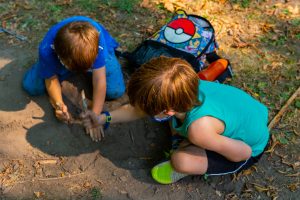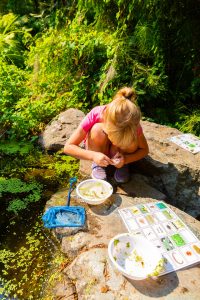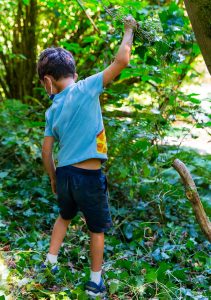Leigh Giangreco · USA Today · January 3, 2023
Featuring Dr. Amber Fyfe-Johnson, Nature and Health researcher
 At least one researcher is probing whether being outdoors helps children or whether those participating in outdoor preschool benefit from other types of privilege. Amber Fyfe-Johnson, an assistant research professor at Washington State University, published a review last year of nearly 300 studies examining the effects of time spent outside on children of all ages.
At least one researcher is probing whether being outdoors helps children or whether those participating in outdoor preschool benefit from other types of privilege. Amber Fyfe-Johnson, an assistant research professor at Washington State University, published a review last year of nearly 300 studies examining the effects of time spent outside on children of all ages.
The review found that green spaces had a positive effect on children’s physical activity, cognition, behavior and mental health. However, the study represented only a brief snapshot, Fyfe-Johnson said.
“Are kids healthier because they’ve been existing in a nature-rich environment, or do people who are already healthy have the opportunity to live in a nature-rich environment?” she said.
Using Tiny Trees as her laboratory, Fyfe-Johnson is conducting a five-year study funded by the National Institutes of Health evaluating the effects of outdoor preschool on health outcomes in childhood. The study, which will conclude this June, looks at 100 children attending Tiny Trees and 100 children attending an indoor preschool, but who were waitlisted at Tiny Trees. About 60% of families involved in the study qualify for free or reduced tuition and 40% are families of color, she said.
 Amber Fyfe-Johnson, ND, PhD, an Assistant Research Professor at the Initiative for Research and Education to Advance Community Health (IREACH) at Washington State University is studying the effects of outdoor learning on kids and believes this type of schooling will lead to better physical and emotional health.
Amber Fyfe-Johnson, ND, PhD, an Assistant Research Professor at the Initiative for Research and Education to Advance Community Health (IREACH) at Washington State University is studying the effects of outdoor learning on kids and believes this type of schooling will lead to better physical and emotional health. But while the state pushes forward to promote outdoor learning, some families have voiced worries about the idea.
But while the state pushes forward to promote outdoor learning, some families have voiced worries about the idea.